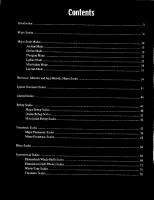Mel Bay Aaron Shearer Learning the Classic Guitar, part 3 (Book & CD) [BK&CD ed.] 0786632097, 9780786632091
Part three teaches the student to form clear and accurate concepts of music expression. It also teaches the guitarist ho
255 92 87MB
English Pages 87 [86] Year 1995
Table of contents :
Frontcover
Cover
Table of Contents
Preface
Interpretation
Introduction
Approaching Expressive Interpretation
The Expressive Musician
Expression and Technique
Regarding Early Music
The Basis of Expressive Playing:Enhancing and Creating Musical Contrast
Expression and the Score
Beginning to Play Expressively: Observing Melodic Contour
The Moving and Shaping Forces of Music
Attractions
Rhythmic Attraction
Melodic Attraction
Harmonic Attraction
Organizing Rhythmic Contrasts: Note-Grouping and Phrasing
The Figure
The Phrase
Defining Note-Grouping and Phrasing
Rubato
Upbeat Grouping
Downbeat Grouping
Summary
Questions for Review
Approaching Expression through Vocalization
Applying Note-Grouping and Phrasing
Applying Rubato and Dynamics
Further Application of Upbeat Grouping
Creating Mood and Spirit
Note-Grouping in Quadruple Meter
Summary
Pieces for Study
F.Sor Andante: Op.60, No.13
F.Sor Andante: Op.60, No.14
D. Aguado Lesson No.15
M. Giuliani Andante: Op.139, No.1
Lesson No.9
Lesson No.12
Lesson No.13
Performance Development
Introduction
The Cause of Performance Anxiety
Evaluating Your Situation
Regarding Technique and Memorization
Approaching Perform.ance Development
Performance Anxiety and Negative Concerns
Dealing with Errors During Performance
Replacing Negative Concerns with Positive Concerns
Summary
Beginning Performance Development
Before You Begin
The Practice Performance
Establishing Your Concentration
The Two Kinds of Performances
Developmental Performance Procedure
Approaching the Formal DP
Learning Effective Stage Conduct
Carrying the Guitar
Guidelines for Walking to the Chair
Guidelines for Bowing
Practicing a Formal DP
The Expressive Performance (EP)
Summary
Backcover
Frontcover
Cover
Table of Contents
Preface
Interpretation
Introduction
Approaching Expressive Interpretation
The Expressive Musician
Expression and Technique
Regarding Early Music
The Basis of Expressive Playing:Enhancing and Creating Musical Contrast
Expression and the Score
Beginning to Play Expressively: Observing Melodic Contour
The Moving and Shaping Forces of Music
Attractions
Rhythmic Attraction
Melodic Attraction
Harmonic Attraction
Organizing Rhythmic Contrasts: Note-Grouping and Phrasing
The Figure
The Phrase
Defining Note-Grouping and Phrasing
Rubato
Upbeat Grouping
Downbeat Grouping
Summary
Questions for Review
Approaching Expression through Vocalization
Applying Note-Grouping and Phrasing
Applying Rubato and Dynamics
Further Application of Upbeat Grouping
Creating Mood and Spirit
Note-Grouping in Quadruple Meter
Summary
Pieces for Study
F.Sor Andante: Op.60, No.13
F.Sor Andante: Op.60, No.14
D. Aguado Lesson No.15
M. Giuliani Andante: Op.139, No.1
Lesson No.9
Lesson No.12
Lesson No.13
Performance Development
Introduction
The Cause of Performance Anxiety
Evaluating Your Situation
Regarding Technique and Memorization
Approaching Perform.ance Development
Performance Anxiety and Negative Concerns
Dealing with Errors During Performance
Replacing Negative Concerns with Positive Concerns
Summary
Beginning Performance Development
Before You Begin
The Practice Performance
Establishing Your Concentration
The Two Kinds of Performances
Developmental Performance Procedure
Approaching the Formal DP
Learning Effective Stage Conduct
Carrying the Guitar
Guidelines for Walking to the Chair
Guidelines for Bowing
Practicing a Formal DP
The Expressive Performance (EP)
Summary
Backcover
![Mel Bay Aaron Shearer Learning the Classic Guitar, part 3 (Book & CD) [BK&CD ed.]
0786632097, 9780786632091](https://ebin.pub/img/200x200/mel-bay-aaron-shearer-learning-the-classic-guitar-part-3-book-amp-cd-bkampcdnbsped-0786632097-9780786632091.jpg)
- Author / Uploaded
- Aaron Shearer
- Commentary
- removed empty page, paginated, bookmarked, attatched missing media files








![Mel Bay You Can Teach Yourself Guitar [Pap/DVD ed.]
9780786667826, 0786667826](https://ebin.pub/img/200x200/mel-bay-you-can-teach-yourself-guitar-pap-dvdnbsped-9780786667826-0786667826.jpg)
